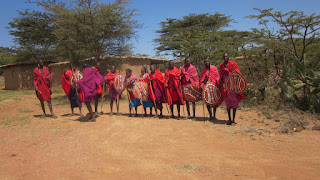What is a Masai Warrior?

You could look up "Masai Warrior" in Wikipedia, but this is what we’ve learned about Masai warriors from our trip:
First of all, there are three specific stages to a Masai man/warrior’s life: baby-hood, warrior-hood and elder-hood. With the exception of Wauma, Hellen's adopted son, all the Masai males we met are in their warrior-hoods (meaning, they've been circumcised).
They all carry cell phones.
They all wear the traditional red plaid and beaded jewelry.
They are all missing their two lower front teeth. When the boy’s “milk” or baby teeth come in they are removed by the blade of a knife which is inserted between the two lower front teeth and then twisted. The same operation is performed on the two lower front permanent teeth which leaves a permanent “hole." Why? So that there will be a way of feeding him should he become incapable of opening his jaw. When his teeth are removed, the kid isn’t supposed to cry or even blink. Nor are they to cry or flinch or blink when their ears are pierced, when their earlobes are cut and stretched, when they receive their marks on the skin of their arms and legs or when they are circumcised at age 13. There's no crying, flinching or blinking among Masai warriors and there isn't much among Masai women.
While some of these practices may seem foreign and perhaps even barbaric to us Westerners, perhaps the practice--at least in part--helps do away with fear of pain or bodily harm. Warriors are formed to be fiercely protective of the women and children of the village. They are aggressive only (from what I've learned) when the village is endangered.
The day we met Chief Ntutu we all got a taste of warrior training. The warriors who support Hellen and who help run Ntutu and Hellen’s safari camps all came out to welcome us with a song and dance with Sinti was the lead singer. Their performance was similar to what we had seen each evening at our campsite--many of those employed for tourism on the Mara are, understandably, Masai. When the welcome was finished, we were each given a shield. Masai warriors also use spears, but for some reason none of us got one of those.
With shields in hand, we took a short walk to a nearby dirt road; the warriors began gathering green sisel—sturdy leaf stems—and we did the same. After we each had a bunch, Ntutu divided us into two groups—Masai and Mzungu (that would be the five of us) warriors in each group. Ntutu instructed the two groups to separate and face each other. And then the Masai began flinging the sisel stems. The shields we were holding, of course, were supposed to be our protection. Nancy and Cyndi were on the same team with Sabore; Jim and I were on the team with Sinti. Carole and Chief Ntutu watched from the sideline (there’s a theme here, I think—Carole also watched while Nancy, Cyndi and I helped make the dung hut). So just imagine Cyndi Alioth out there flinging sticks. Oh, and hers and Nancy’s team were up wind. So my experience of the event was throwing sisel with all my might (so what if I throw like a girl?) and watching them land halfway between me and the opposing team. The shield offered good protection from the sisel stems which arrived with bullet-force; heaven help anyone if they got whacked by one of those things. The real warriors were those with no shields—they were guys who had given theirs to one of us. There were amazingly deft at picking up and throwing and extremely brave because I think they were the real targets for the opposing Masai warriors. I was Cyndi’s target. Thank goodness I had a shield.
In the end, Cyndi and Nancy’s team won.
For the serious men these are, the warriors were very friendly and encouraging: when they were pleased at something we did during our “training, “ they put out their arm towards us and placed a hand on one of our shoulders, inviting us to do the same so that our arms were entwined and our hands resting on each other's shoulders—a lovely gesture of friendship and goodwill.
In the end, our training ended more in laughter than fighting; most certainly Ntutu and Carole laughed the most given their vantage point. To me it felt a little like the experience of being prepared for our high school powerpuff football games by the football players; the exercise was mostly friendly and fun and for a brief moment it felt as if we all were kind of on the same team, as if we were all of a tribe, fighting and laughing. All in all, given the accuracy and strength of the Masai warriors, I am glad we were fighting with sticks and not spears. Should it come to protecting their village, however, spears would be at the ready.
The warriors we met and “trained” with work for Ntutu’s safari business as guides; all of them are dedicated to supporting Hellen and her work. Some of these men were present each day we were with Hellen. I didn’t get at first what they were doing at her village—they seemed to be hanging around, sometimes taking part in the things we were all doing and in the conversations we were having and sometimes talking together amongst themselves in Maa (Masai language). It finally occurred to me, however, that they were there to protect Hellen, Hellen’s women and us.
From whom or what are they protecing us? For the most part, from the wild animals that share the Masai Mara. When Hellen’s campsite is up and running, they will be also protecting the tourists who come to her Safari camp.


Comments